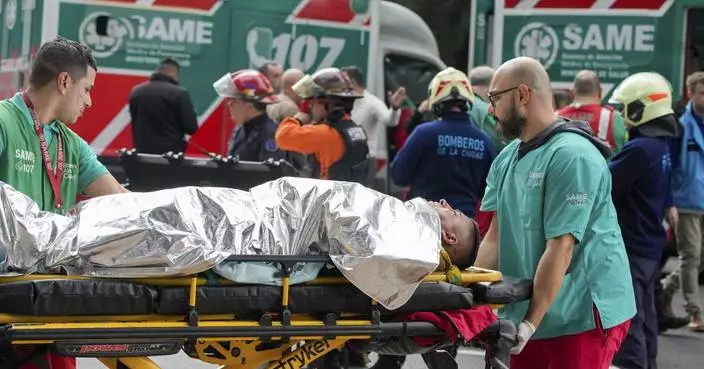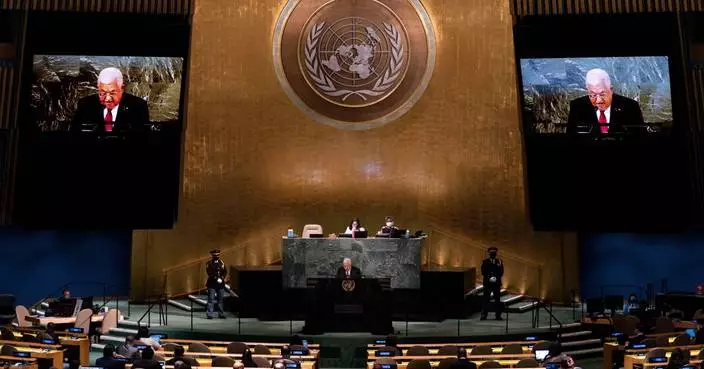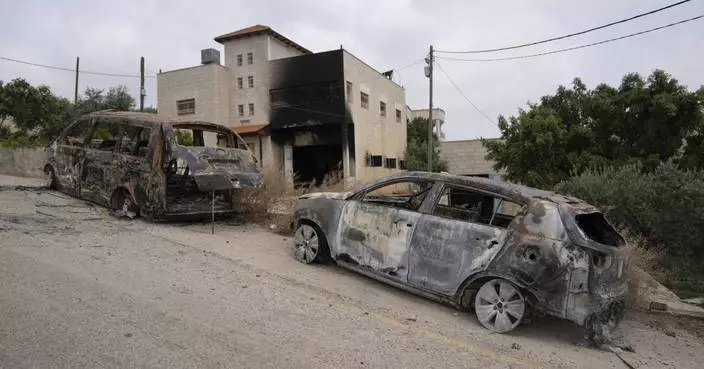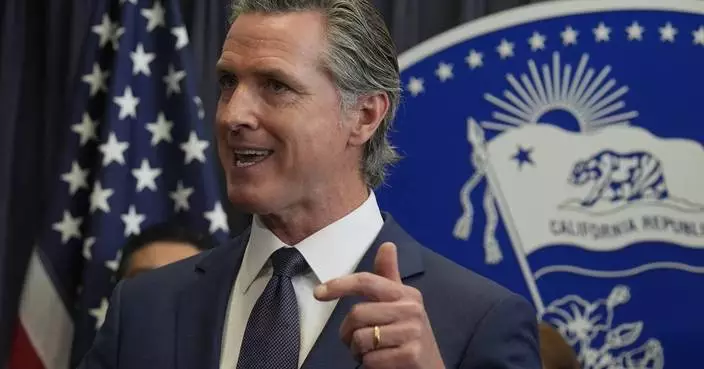California Sen. Kamala Harris has described her experience as a student at a historically black college as "one of the most important aspects" of her life. Now, her Democratic presidential campaign is using that experience to connect with voters.
Not only is she one of only two black candidates in a field that's expected to grow to more than 20 candidates, she's also the only candidate who attended a historically black college or university, commonly called an HBCU. And she's the first major-party candidate to have graduated from an HBCU — Washington's Howard University — since Jesse Jackson ran for president in the 1980s.
To be sure, she is not the only candidate focusing on such institutions.
Massachusetts Sen. Elizabeth Warren, New York Sen. Kirsten Gillibrand and former Texas Rep. Beto O'Rourke have campaigned at historically black colleges. So has the other black candidate in the 2020 race, New Jersey Sen. Cory Booker.
At a CNN town hall last month in Orangeburg, home to two of South Carolina's HBCUs, Booker noted that his parents and grandparents were educated at historically black institutions and that "the majority of black doctors, black lawyers, black generals are produced by HBCUs."
But Harris's campaign has visited more historically black colleges than any candidate, and she is burnishing her personal ties to this community, and not just to current students.
"Presidential candidates are recognizing HBCUs as a political and cultural center for the broader black community," said Aimee Allison, the founder of the political network She The People, which plans a candidate forum Wednesday at Texas Southern University, a historically black college.
Allison said that holding events at these schools is an "essential part of a long-term strategy to build trust and relationships" with black voters.
Harris's focus on historically black colleges could be particularly important in South Carolina, home to eight HBCUs. Black voters are vital to success for Democratic primary candidates anxious to win the South's first primary.
In Orangeburg, Harris's town hall Saturday night was moderated by Bakari Sellers, a former South Carolina state representative who recently endorsed her campaign.
Turning to a group of South Carolina State students seated on bleachers, Harris talked briefly about the value of attending a historically black institution.
"At an HBCU, everything you are told is that you can be whatever you want to be, and there will be no barriers to that success," she said. "And you are told as a young black student that you do not need to make choices and fit into anyone's narrow definition of what it means to be a young black person in America."
Harris added later that historically black colleges "teach us that there will always be a community that will support us, whatever we will decide to do,"
Including, perhaps, running for president.
Joann Berry, a 66-year-old who worked at South Carolina State for more than two decades, said that historically black colleges don't just give diplomas, "they're more like family." She said that the fact that Harris had attended an HBCU could give her an advantage with connecting here.
While Berry has yet to decide who to support in South Carolina's primary, she said Harris is among the candidates she's considering.
"I'm proud of her. I have faith in her just like I had faith in Barack Obama," said Berry. "A lot of people said he couldn't do it — and he won."
Harris' campaign has made a number of overt appeals, in South Carolina and elsewhere, to the network of HBCUs.
One of Harris's early congressional backers, California Rep. Barbara Lee, held events at Benedict College in Columbia on her behalf.
Harris also waded into the local issue of Denmark Technical College, which primarily serves residents of rural Allendale, Bamberg and Barnwell counties, and has been battling declining enrollment.
Her first significant policy rollout, aimed at increasing teacher pay nationwide, specifically calls for the federal government to support programs dedicated to teacher recruitment, training and professional development, particularly at HBCUs.
Harris's first news conference as a presidential candidate was held at her alma mater, with the leaders of the Howard University Student Association on hand. She recalled that she had run her first political campaign as freshman class representative.
"This is where it all began," she said.
On Twitter, her campaign even took note of Beyonce's "Homecoming," which was released this past week and paid homage to the musical legacy of historically black colleges. Harris said "Homecoming" ''exemplifies and rightly celebrates the spirit and legacy of HBCUs."
"She brought our culture and tradition to the world stage and as a proud Howard graduate, I can't wait to watch," Harris wrote.
Other times, the exchanges come unprompted.
On an earlier trip to South Carolina, Harris was addressing a gathering of more than a dozen female leaders in Columbia when 83-year-old Marjorie Hammock arrived. Hammock, wearing a crew-neck Howard University sweat shirt, slowly made her way through a throng of reporters and onlookers.
When Harris noticed her, she immediately called to her.
"Hey, Bison, I know you," Harris said, referencing Howard's mascot, as the women laughed.
"We both went to Howard," said Harris, 54, and joked, "I was there before her."
Hammock, who attended Howard in the 1950s, said later that Harris's campaign "gives me also hope for this country" and that seeing a Howard graduate run for president "reinforces the fact that the legacy continues."
WASHINGTON (AP) — A soon-to-be-released Biden administration review of Israel's use of U.S.-provided weapons in its war in Gaza does not conclude that Israel has violated the terms for their use, according to three people who have been briefed on the matter.
The report is expected to be sharply critical of Israel, even though it doesn't conclude that Israel violated terms of U.S.-Israel weapons agreements, according to one U.S. official.
The administration's findings on its close ally's conduct of the war, a first-of-its-kind assessment that was compelled by President Joe Biden's fellow Democrats in Congress, comes after seven months of airstrikes, ground fighting and aid restrictions that have claimed the lives of nearly 35,000 Palestinians, mostly women and children.
Biden has tried to walk an ever-finer line in his support of Prime Minister Benjamin Netanyahu’s war against Hamas. He has faced growing rancor at home and abroad over the soaring Palestinian death toll and the onset of famine, caused in large part by Israeli restrictions on the movement of food and aid into Gaza. Tensions have been heightened further in recent weeks by Netanyahu’s pledge to expand the Israeli military’s offensive in the crowded southern city of Rafah, despite Biden's adamant opposition.
Biden is in the closing months of a tough reelection campaign against Donald Trump. He faces demands from many Democrats that he cut the flow of offensive weapons to Israel and denunciation from Republicans who accuse him of wavering on support for Israel at its time of need.
Two U.S. officials and a third person briefed on the findings of the national security memorandum to be submitted by Secretary of State Antony Blinken to Congress discussed the findings before the report's release. They spoke on condition of anonymity because the information was not yet public.
A senior Biden administration official said the memorandum is expected to be released later Friday, but declined to comment on its conclusions.
Axios first reported on the memorandum's findings.
The Democratic administration took one of the first steps toward conditioning military aid to Israel in recent days when it paused a shipment of 3,500 bombs out of concern over Israel’s threatened offensive on Rafah, a southern city crowded with more than a million Palestinians, a senior administration official said.
The presidential directive, agreed to in February, obligated the Defense and State departments to conduct “an assessment of any credible reports or allegations that such defense articles and, as appropriate, defense services, have been used in a manner not consistent with international law, including international humanitarian law.”
The agreement also obligated them to tell Congress whether they deemed that Israel has acted to “arbitrarily to deny, restrict, or otherwise impede, directly or indirectly,” delivery of any U.S.-supported humanitarian aid into Gaza for starving civilians there.
Lawmakers and others who advocated for the review said Biden and previous American leaders have followed a double standard when enforcing U.S. laws governing how foreign militaries use U.S. support, an accusation the Biden administration denies. They had urged the administration to make a straightforward legal determination of whether there was credible evidence that specific Israeli airstrikes on schools, crowded neighborhoods, medical workers, aid convoys and other targets, and restrictions on aid shipments into Gaza, violated the laws of war and human rights.
Their opponents argued that a U.S. finding against Israel would weaken it at a time it is battling Hamas and other Iran-backed groups. Any sharply critical findings on Israel are sure to add to pressure on Biden to curb the flow of weapons and money to Israel’s military and further heighten tensions with Netanyahu’s hard-right government over its conduct of the war against Hamas.
Any finding against Israel also could endanger Biden’s support in this year's presidential elections from some voters who keenly support Israel.
At the time the White House agreed to the review, it was working to head off moves from Democratic lawmakers and independent Sen. Bernie Sanders of Vermont to start restricting shipments of weapons to Israel.
Israel launched its offensive after an Oct. 7 assault into Israel, led by Hamas, killed about 1,200 people. Two-thirds of the Palestinians killed since then have been women and children, according to local health officials. U.S. and U.N. officials say Israeli restrictions on food shipments since Oct. 7 have brought on full-fledged famine in northern Gaza.
Human rights groups long have accused Israeli security forces of committing abuses against Palestinians and have accused Israeli leaders of failing to hold those responsible to account. In January, in a case brought by South Africa, the top U.N. court ordered Israel to do all it could to prevent death, destruction and any acts of genocide in Gaza, but the panel stopped short of ordering an end to the military offensive.
Israel says it is following all U.S. and international law, that it investigates allegations of abuse by its security forces and that its campaign in Gaza is proportional to the existential threat it says is posed by Hamas.
Biden in December said “indiscriminate bombing” was costing Israel international backing. After Israeli forces targeted and killed seven aid workers from the World Central Kitchen in April, the Biden administration for the first time signaled it might cut military aid to Israel if it didn’t change its handling of the war and humanitarian aid.
Presidents Ronald Reagan and George H.W. Bush, in the 1980s and early 1990s, were the last presidents to openly hold back weapons or military financing to try to push Israel to change its actions in the region or toward Palestinians.
A report to the Biden administration by an unofficial, self-formed panel including military experts, academics and former State Department officials detailed Israeli strikes on aid convoys, journalists, hospitals, schools and refugee centers and other sites. They argued that the civilian death toll in those strikes — such as an Oct. 31 strike on an apartment building reported to have killed 106 civilians — was disproportionate to the blow against any military target.
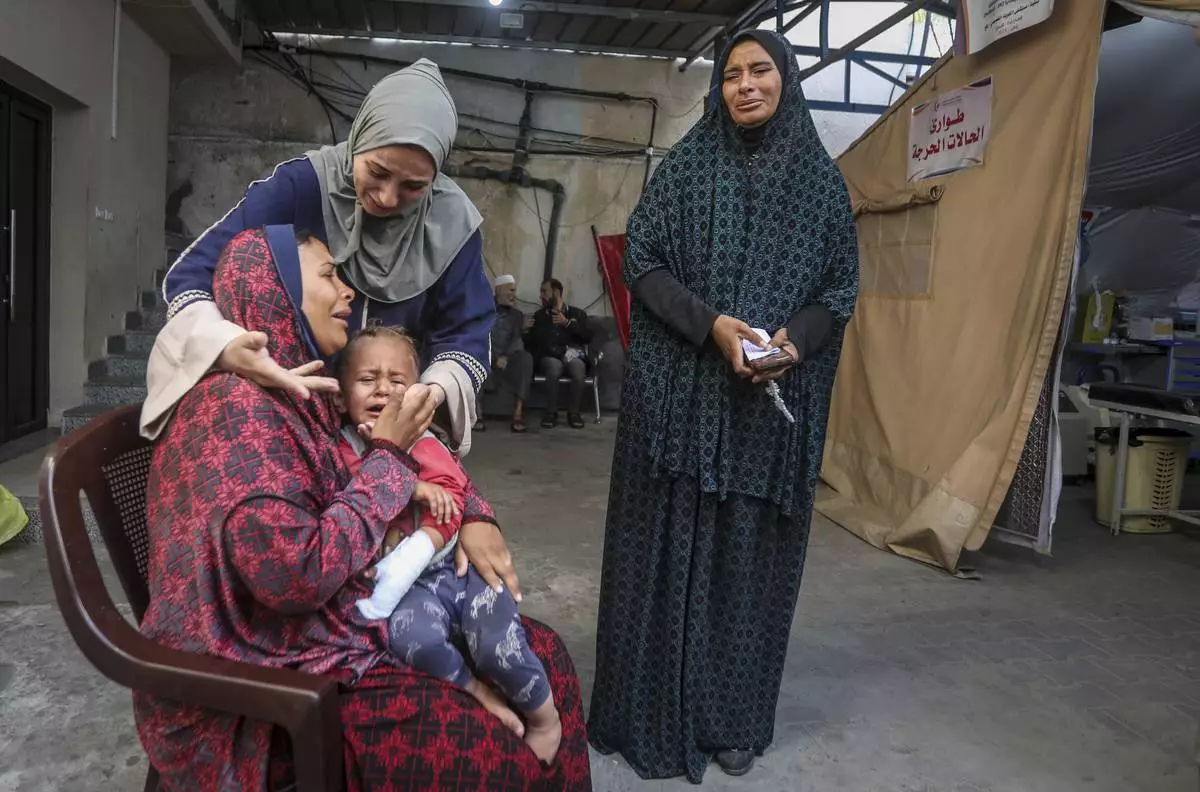
Palestinians mourn their relatives killed in the Israeli bombardment of the Gaza Strip, at a hospital in Rafah, Gaza, Friday, May 10, 2024. (AP Photo/Ismael Abu Dayyah)

U.S. President Joe Biden boards Marine One at Moffett Airfield in Mountain View, Calif., Thursday, May 9, 2024. (Jose Carlos Fajardo/Pool Photo via AP)





